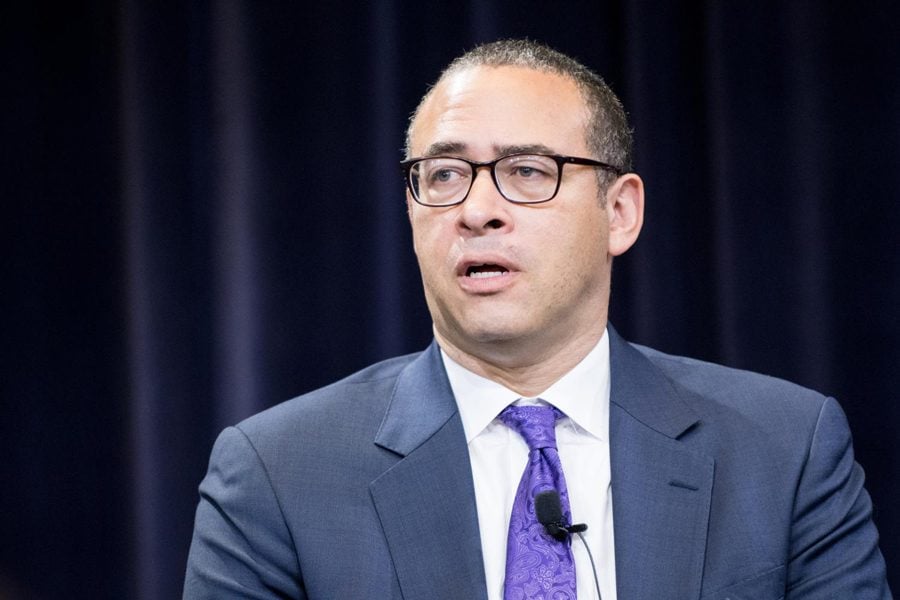In interview, Provost Holloway connects his academic plan to the University’s financial future
Daily file photo by Colin Boyle
Jonathan Holloway. The provost said he works with vice president for business and finance Craig Johnson to ensure academic plans have proper funding ahead of time.
April 29, 2019
On April 22, three members of The Daily’s editorial board sat down with Provost Jonathan Holloway. Jeri Ward, the vice president for global marketing and communications, also sat in on the meeting. Holloway talked about funding his academic vision and interdisciplinary learning. His answers have been edited for clarity and brevity. Portions of the interview have been excluded from this transcript that have been withheld for future Daily articles. A transcript featuring another part of this interview can be found here.
The Daily: How do you connect your academic vision to the University’s seven-year financial plan?
Holloway: When (vice president for business and finances) Craig Johnson came on board, we really started thinking more carefully about not just putting out the fires that he and I had each inherited when we showed up, but building a structure for the future so we can be much better predictor(s) of where we’re going and what the risks are at any different moment in time. And one of the risks was related to capital projects.
Right when I started, we were about to put shovels in the ground on (Donald) Jacobs (Center), but then everything came to a screaming halt. We’re not breaking ground on new things. This Northwestern you see now may look like this for another couple of years, but it will be changing, getting back up to speed and renovating buildings and taking things down and putting some things up. We need to have a plan to execute upon that, and so that’s the seven-year capital plan. And that will always be seven years moving forward.
That was an important piece of infrastructure. When we gut and renovate a building on North campus, and we’re gonna do that in five years, we need to know now to have the finances ready in five years. And that kind of long-range forecasting is really something that at least in the last previous few years, we had gotten away from, for one reason or another.
Then, layering on top of that, is actually the academic plans. We’re gonna start doing different buildings. So, my team and Craig’s team work closely together, and I went to the Board of Trustees in March to present my academic vision for the University. I said here’s the academic vision, but now these are the buildings that are affected, and, in order, what has be done.
The Daily: How does the necessity of connecting capital projects and academic vision change for different departments?
Holloway: When it comes to the faculty, we are excellent in the field of chemistry — one of the best schools in the country. And, we are really quite strong in history as well. The resource base to hire one chemist versus one historian is very different. The space requirements for one chemist versus one historian is radically different. Even for a starting assistant professor for chemistry and a Pulitzer Prize-winning senior historian — that chemist is still way more expensive than the historian, and the chemist needs way more space than the historian. So, there’s no single answer, and it’s incredibly complex.
My office, Craig’s office and (vice president for research) Jay Walsh’s office have to be in really close contact when it comes to space demands. That’s really the trickiest thing of all. It is more finite than cash. We have to be in conversation so all of our units are engaged with the deans in the relevant spaces to make sure we’re being as efficient as possible in how we use space, and we just have to pay attention. There is no specific answer because historians need a library and a salary and very modest research budget. Chemists, depending on the kind of chemist they are, need a laboratory space. An engineer may need both of those things, depending on what kind of engineering he or she is doing. A theatre professor needs a black box. So it really kind of just depends.”
The Daily: How do you enforce your vision of making academics more interdisciplinary?
Holloway: The way it works is me telling the deans, I will respect your academic vision because you’re closer to areas of expertise, (but) because we are this kind of school, interdisciplinary, theory and applied, the more we can emphasize that in the hires that you propose to us or in the initiatives that you want to start, the more kindly we will look on that.
Deans present their hiring plans to me in the summer. I’m the one who determines what searches are being held, my office is. So the more that the deans are in line with the general concept of thinking with interdisciplinary scholarship, then they’ll be aligning with the academic vision.
It’s not that we aren’t gonna look for an English professor doing Milton, like a very traditional, specific kind of field. No, if we need it, we’ll go for the English professor doing Milton. But I want to encourage our deans to be thinking these other spaces too.”
Email: [email protected]
Twitter: @birenbomb


